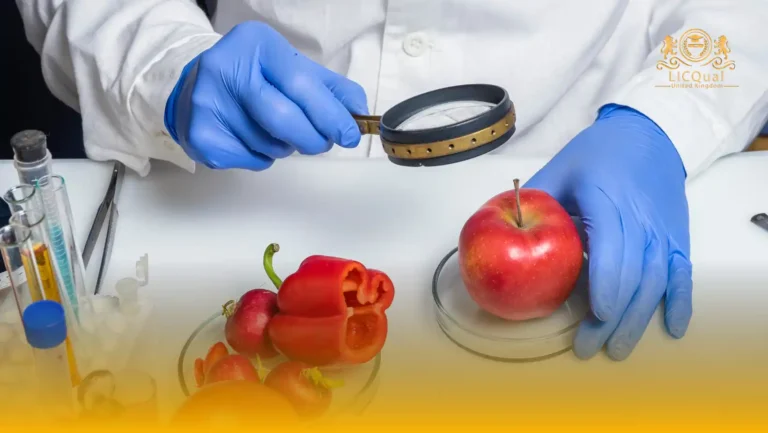The LICQual Level 3 Diploma in Clinical Oncology Nutrition (Dip Oncology Nutrition) is a specialised qualification designed for learners seeking advanced knowledge and practical expertise in nutrition for cancer care. This diploma provides in-depth understanding of the nutritional challenges faced by oncology patients, including the impact of cancer, treatment-related side effects, and the role of diet in supporting recovery, treatment tolerance, and overall wellbeing.
Ideal for healthcare professionals, dietitians, nutritionists, nurses, and wellness practitioners, this qualification enables learners to expand their professional knowledge, enhance their career prospects, and engage in meaningful Continuing Professional Development (CPD). Learners gain the skills to assess nutritional status, develop personalised nutrition plans, and implement evidence-based dietary interventions tailored to the needs of oncology patients.
LICQual ensures that all centres delivering this diploma uphold the highest standards of teaching and training. Centres must employ competent and qualified staff and provide access to up-to-date learning materials, clinical resources, and practical tools required to deliver high-quality education. This ensures learners receive a comprehensive learning experience that combines theoretical understanding with practical application in professional settings.
By completing this diploma, learners achieve a recognised qualification that strengthens their professional credibility and equips them with the knowledge and skills to support oncology patients effectively. The programme is structured to provide a balanced blend of scientific theory and practical application, empowering learners to deliver high-quality nutritional care and improve patient outcomes in clinical, hospital, and community-based settings.
Course Overview
Qualification Title
LICQual Level 3 Diploma in Clinical Oncology Nutrition (Dip Oncology Nutrition)
Total Units
6
Total Credits
60
GLH
240
Qualification #
LICQ2201042
Qualification Specification
To enroll in the LICQual Level 3 Diploma in Clinical Oncology Nutrition (Dip Oncology Nutrition) , applicants must meet the following criteria:
|
Qualification# |
Unit Title |
Credits |
GLH |
|---|---|---|---|
|
LICQ2201042-1 |
Fundamentals of Oncology Nutrition |
10 |
40 |
|
LICQ2201042-2 |
Nutritional Assessment in Oncology |
10 |
40 |
|
LICQ2201042-3 |
Nutrition Support and Intervention Strategies |
10 |
40 |
|
LICQ2201042-4 |
Cancer Treatment and Nutritional Considerations |
10 |
40 |
|
LICQ2201042-5 |
Research Methods and Evidence-Based Practice in Oncology Nutrition |
10 |
40 |
|
LICQ2201042-6 |
Practical Applications of Clinical Oncology Nutrition |
10 |
40 |
By the end of this course, learners will be able to:
Unit 1: Fundamentals of Oncology Nutrition
By the end of this unit, the learner will be able to:
- Explain the principles of oncology nutrition and its role in patient care
- Analyse the impact of cancer on metabolism, nutrient requirements, and overall health
- Identify common nutritional challenges faced by oncology patients
- Evaluate strategies to support nutritional wellbeing in individuals living with cancer
Unit 2: Nutritional Assessment in Oncology
By the end of this unit, the learner will be able to:
- Conduct comprehensive nutritional assessments using anthropometric, biochemical, clinical, and dietary tools
- Interpret assessment data to identify malnutrition and nutrient deficiencies
- Analyse patient-specific factors affecting nutritional status
- Apply assessment findings to inform personalised nutrition plans
Unit 3: Nutrition Support and Intervention Strategies
By the end of this unit, the learner will be able to:
- Explain dietary interventions for oncology patients, including enteral and parenteral nutrition
- Develop strategies to manage treatment-related side effects such as nausea, vomiting, cachexia, and appetite loss
- Evaluate the effectiveness of nutrition support strategies in improving patient outcomes
- Implement evidence-based nutrition interventions in clinical practice
Unit 4: Cancer Treatment and Nutritional Considerations
By the end of this unit, the learner will be able to:
- Explain the nutritional implications of surgery, chemotherapy, radiotherapy, and immunotherapy
- Analyse the impact of cancer treatments on patient metabolism and dietary needs
- Develop nutrition plans that support treatment tolerance and recovery
- Apply practical strategies to manage dietary challenges during and after cancer treatment
Unit 5: Research Methods and Evidence-Based Practice in Oncology Nutrition
By the end of this unit, the learner will be able to:
- Explain research methodologies relevant to oncology nutrition
- Collect, analyse, and interpret data from research studies and clinical practice
- Critically evaluate scientific literature to inform evidence-based practice
- Apply research findings to improve nutritional care and patient outcomes in oncology settings
Unit 6: Practical Applications of Clinical Oncology Nutrition
By the end of this unit, the learner will be able to:
- Apply theoretical knowledge to create personalised nutrition plans for oncology patients
- Conduct dietary assessments and monitor patient progress in clinical settings
- Implement practical nutrition interventions that enhance patient wellbeing and treatment outcomes
- Demonstrate professional practice in delivering oncology nutrition support
This diploma is ideal for:
- Healthcare professionals, dietitians, nutritionists, and nurses seeking to specialise in oncology nutrition
- Individuals working in clinical oncology, hospital nutrition services, cancer care units, or wellness sectors
- Learners interested in nutrition support for cancer patients during treatment and recovery
- Professionals aiming to expand knowledge of treatment-related dietary challenges and evidence-based nutritional interventions
- Graduates or practitioners looking to enhance career prospects and professional credibility
- Those committed to Continuing Professional Development (CPD) and evidence-based oncology nutrition practice
- Individuals aspiring to work in clinical, hospital, or community-based cancer care settings
- Professionals seeking to integrate scientific and practical knowledge of nutrition to improve oncology patient outcomes
To deliver the LICQual Level 3 Diploma in Clinical Oncology Nutrition effectively, centres must meet the following requirements:
- Qualified and Competent Staff: All teaching and assessment personnel must hold relevant qualifications and demonstrate expertise in oncology nutrition, healthcare, or related fields.
- Access to Learning Resources: Centres must provide learners with up-to-date textbooks, digital learning materials, journals, and clinical tools to support effective study and research.
- Facilities for Practical Learning: Centres should have suitable facilities, including clinical, laboratory, or simulation spaces, to allow learners to apply nutritional principles in practical settings.
- Assessment and Monitoring Systems: Centres must implement structured assessment procedures, track learner progress, and provide timely, constructive feedback in line with LICQual standards.
- Health and Safety Compliance: Learning environments must adhere to local health and safety regulations to ensure the safety of learners during practical activities.
- Quality Assurance Processes: Centres must have robust quality assurance mechanisms to maintain high standards of teaching, learning, and assessment.
- Learner Support: Centres should provide guidance, mentorship, and access to additional resources to support learner success and professional development.
These requirements ensure learners receive high-quality, internationally-standardised training, equipping them with the knowledge and practical skills needed to deliver effective nutritional care for oncology patients in clinical and community-based settings.
Assessment and Verification
All units within this qualification are subject to internal assessment by the approved centre and external verification by LICQual. The qualification follows a criterion-referenced assessment approach, ensuring that learners meet all specified learning outcomes.
To achieve a ‘Pass’ in any unit, learners must provide valid, sufficient, and authentic evidence demonstrating their attainment of all learning outcomes and compliance with the prescribed assessment criteria. The Assessor is responsible for evaluating the evidence and determining whether the learner has successfully met the required standards.
Assessors must maintain a clear and comprehensive audit trail, documenting the basis for their assessment decisions to ensure transparency, consistency, and compliance with quality assurance requirements.







